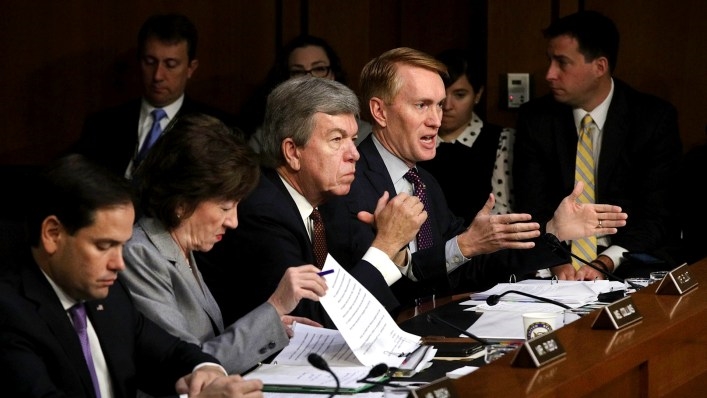Senators to Facebook, Google, And Twitter: Where Are Your CEOs?
For the second day in a row, executives from Facebook, Google, and Twitter faced intense scrutiny on Capitol Hill. Lawmakers pressed the tech giants to account for disinformation spread on their platforms, the methods by which Russia and other foreign states can manipulate these companies’ services, and whether U.S. government intervention is necessary to avoid a continuation of the digital problems that engulfed the 2016 U.S. presidential election.
“What we’re talking about is the beginning of cyberwarfare: a major foreign power with the sophistication and ability to involve themselves in a presidential election and sow conflict and discontent all over this country,” said Sen. Dianne Feinstein of California.
“You have a huge problem on your hands,” she told the companies’ representatives. “We are not going to go away, gentleman. This is is a very big deal.”
The testimony, at two back-to-back hearings before the Senate and House Intelligence committees, served as a reckoning for the tech companies, which had previously sought to downplay their impact on the election. Only in recent months have they finally begun to publicly acknowledge that Russian operatives had attempted to influence the outcome of the vote with what senators are now calling “paid-for-by-rubles” ads.
During today’s at-times-testy hearings, committee members sought to push the discussion beyond issues related to paid ads, centering many of their questions to lawyers from Facebook, Google, and Twitter on unpaid, organic content and its broader societal effects.
Lawmakers also pushed the tech reps to specifically explain which measures their companies have taken to police their own platforms.
“You bear this responsibility: You’ve created these platforms, and now they’re being misused,” Feinstein said in one of the more fiery exchanges of the morning’s Senate hearing. “You have to be the ones to do something about it–or we will,” she added, hinting at the threat of government regulation.
Indeed, if Tuesday’s testimony before the Senate Judiciary Committee was intended to take the technology companies to task for their failure to hinder Russian interference in the election, Wednesday’s hearings focused on how to prevent such influence from occurring again. Previously, Facebook had reported that Kremlin-backed propaganda reached 126 million users on the social network via inflammatory ads and posts; Google found that over 1,000 Russia-linked videos were uploaded to its YouTube service; and Twitter disclosed that Russian-connected bots generated roughly 288 million impressions on the platform. But senators and congressional representatives spent less time today repeating these eye-popping data points, and instead pushed the tech giants to provide specific solutions to these problems.
Responsibility Of Big Tech
For the most part, lawmakers criticized Facebook, Google, and Twitter for not doing enough to police the content on their services, whether via ads or user-generated posts.
“Your actions need to catch up to your responsibilities,” Sen. Richard Burr said in his opening remarks, while Sen. Susan Collins said these megacompanies have a “special obligation” to monitor even “unpaid content,” meaning posts that spread organically on their network. Too often, Congressman Adam Schhiff said in the afternoon’s House Intel committee hearing, this amounts to “fear- and anger-based” content that “percolates to the tops of [your news] feeds . . . pitting American against American.”
Sen. Angus King, of Maine, went so far as to compare the fake content on their platforms to supermarket aisle tabloids newspapers featuring the “movie star with a two-headed baby”.
In response to the outcry over disinformation online, Facebook general counsel Colin Stretch said that the social network is primarily aims to improve “authenticity” on the platform and that it “pains us” that foreign actors would “abuse” its platform in a “cynical effort to prey on fault lines in this country.”
Likewise, Google general counsel Kent Walker said his company is very “concerned about this divisive content,” and said the company is focused on bettering its algorithms to weed out low-quality search results and news. “The North Star for Google is to provide accurate and relevant information,” he said.
Neither answer seemed to satisfy committee members.
Sen. Mark Warner’s questions insinuated that it is a cheap business practice to allow anyone to amplify false information on these platforms, calling it a “tremendous bang for the disinformation buck.” In an exchange repeated in different forms throughout the day, Warner pressed Twitter acting general counsel Sean Edgett on the proliferation of bots and fake accounts on that platform. Edgett suggested, according to the company’s estimates, that bots represent just around 5% of accounts on Twitter–although he acknowledged “spammers and bad actors are getting better” at circumventing the company’s preventative measures.
Warner, clearly frustrating by the lawyers’ answers, said he’s seen estimates that bots represent as much as 12% to 15% of accounts on these wildly popular platforms. Given all the data and technical sophistication these companies often claim to have at their disposal, Warner argued that they could be doing a much better job of protecting their platforms from malevolent actors.
“Your companies know more about Americans than the US government does,” he pointed out.
Regulation Is Coming
Like (November 03, 2017)’s Judiciary Committee, lawmakers at today’s hearings didn’t buy the Silicon Valley companies’ typical excuse that they are simply “technology platforms,” and therefore are not liable, in most cases, for the content that flows through their services.
“You are the modern town square, modern postmaster, the phone company, the Yellow Pages, you are the newspaper, and the radio broadcaster, and the television system, and the emergency alert system,” said Democratic Senator Kamala Harris, of California, listing a variety of industries that are subject to government regulation–unlike Twitter, Facebook, and Google.
Senator John Cornyn, the Republican majority whip from Texas, picked up on that thread, asking, “Why should your companies be treated any differently than the press from a legal accountability standpoint?” After a ten-second pause, Twitter’s Edgett responded, “We believe as a user-generated content platform, we want to allow free expression and debate without…interference.” Cornyn pressed again him to answer whether these digital services ought to be treated any differently than a newspaper, radio, or cable TV show. “We’re not producing the content; we’re allowing users to upload [it],” Edgett said.
“That may well be a distinction that is lost on most of us—that you’re just a platform for other people to express their views, as opposed to being a publisher,” retorted Cornyn.
When asked by Sen. Joe Manchin about proposed legislation that would have tech companies be “regulated and overseen in the same ways as we do news media,” all three tech company lawyers present went quiet.
“Anyone have any comment? Are you all going to fight back on that [legislation]?” Manchin asked. “[Regulation] that would assure the American people are getting facts and not fake news?”
Facebook’s Colin Stretch told Manchin that his company “would work with the committee” on potential legislation, but didn’t commit to anything more specific. However, regarding recently proposed legislation that would require tech companies to disclose more information about their paid political ads, Edgett said Twitter is “supportive”, though it has “some fine-tuning we’d love to talk about.”
But the tech companies’ general counsel mostly stuck to talking points: that their internal algorithms could best police the endless troves of data streaming through their services. Rep. Terri Sewell disagreed. She pointed to the low representation of minorities in Silicon Valley, specifically highlighting how African-Americans make up just roughly 2% of Facebook’s leadership, and suggesting that the lack of diversity would could lead to algorithm biases. “And you’re saying that I should trust that your [employees] vetting this kind of information would be a diverse workforce?” Sewell asked.
Facebook’s Stretch barely said she should be “confident that we understand the importance of diversity” before Sewell cut him off. “There seems to be some legislation that needs to be had here,” she said.
Get Me Jack, Mark, And Larry
For the third time in two days, lawmakers expressed dissatisfaction not only with many of the answers from the tech companies–Sen. Feinstein, who was present at both Senate hearings, said their responses were too “vague,” and called them a “profound disappointment”–but also by who was delivering the answer. Without the leaders of these companies present–Twitter CEO Jack Dorsey; Alphabet CEO Larry Page (or Google CEO Sundar Pichai); and Facebook CEO Mark Zuckerberg–there’s a sense that these tech giants can’t fully be held accountable for their mistakes before, during, and after the 2016 presidential election.
Said Sen. King to the tech company lawyers present, “[I’m] disappointed you’re here and not your CEOs.”
He wasn’t alone. Later in the hearing, Sen. Manchin echoed that view, arguing that he “wish[ed] your CEOs would be here” to testify. “They need to answer for this.”
Fast Company , Read Full Story
(17)














